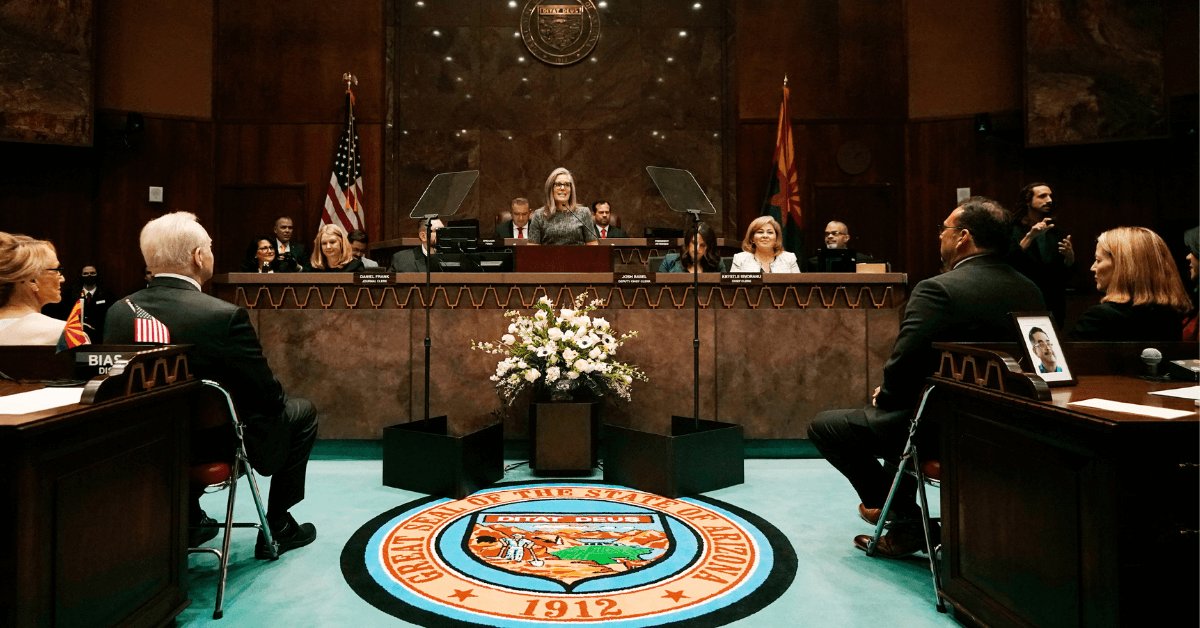
AP Photo/Ross D. Franklin
Arizona voters will find nearly a dozen measures on the ballot this November, covering topics ranging from lifetime appointments for judges to tax refunds for property owners.
The state legislature referred 11 measures to the 2024 ballot, the most lawmakers have put before voters since 1984. The increase is partially an attempt by the Republican-controlled legislature to circumvent Democratic Gov. Katie Hobbs’ veto and avoid compromising with Democrats to pass bills that the governor would sign into law.
Not all 11 are guaranteed to make it to the ballot, however; lawsuits have been filed against at least three. More still could be added, as citizen initiatives like the Arizona for Abortion Access Act are expected to qualify for the November ballot as well.
Below are the proposals passed by the legislature, divided into two sections: constitutional amendments and state statutes. Amendments to the constitution are more difficult to change, while statutes deal more with the day-to-day laws that govern residents’ lives.
Some measures have already been reviewed by the Arizona Secretary of State and have been assigned proposition numbers. Those that have not been reviewed are referred to by their legislative titles: Senate Concurrent Resolution (SCR) and House Concurrent Resolution (HCR).
Make sure to bookmark this page! The article will be updated as legal challenges are heard in courts and the 2024 ballot is finalized.
Constitutional Amendments
Proposition 133: Political parties nominate candidates
Elections run in phases, and this proposal would alter how partisan elections run their primary phase.
The amendment would grant political parties the authority to put one candidate on the ballot for every qualifying race, meaning candidates wouldn’t need petition signatures from voters, only the blessing of party leaders. The move would shift significant power away from the general public—particularly independents, which make up one-third of Arizonans—in favor of political parties.
It would also give an outsized voice, to smaller parties recognized by the state. The Libertarian, Green, and No Labels parties—less than 2% of voters collectively—would be able to nominate candidates for every partisan race, from US President to precinct constables, without collecting a single signature of support from voters. Independent voters, on the other hand, would have no saved spot for them on the ballot, as there is no recognized Independent Party in Arizona.
Proposition 134: District requirements for citizen initiatives
This would change the requirements for citizen initiatives. In order to qualify for the ballot under this law, initiatives would need to collect signatures from 10% of qualified voters in each legislative district—15% if the proposal requires a constitutional amendment.
Current law requires citizens to collect the same percentages of signatures, but for the overall population of the state, not individual districts. The difference is akin to the popular vote versus the Electoral College for the US presidential election; one favors the majority, while the other tips the scales in favor of rural voters. The likely end result would be that progressive measures would have a far more difficult time getting to a vote of the people than conservative ones.
Proposition 135: Restrictions on emergency powers
This proposal was introduced in response to former Gov. Doug Ducey’s use of emergency powers in the early months of the COVID-19 pandemic, and would drastically limit the governor’s power during an emergency.
If approved by voters, this would amend the state constitution to:
- Limit the governor’s emergency powers to 30 days, unless extended by the legislature
- The legislature can add restrictions to limit the governor’s power during emergencies
- The governor would be required to call a special legislative session if petitioned by 30% of state senators and state representatives
- If an emergency order is not extended by the legislature, the governor would be prohibited from declaring another from the same emergency
HCR 1040: Reduced minimum wage for tipped employees
Arizona has one of the most progressive minimum wage laws in the country, thanks to the voter-approved Fair Wages and Healthy Families Act of 2016. In addition to tying the minimum wage to inflation, it established wage protections for tipped workers to guarantee they can’t make less than what non-tipped employees make.
Current law allows employers to pay tipped employees up to $3 less per hour if they can prove that the employee’s tips make up the difference. HCR 1040 seeks to change this by lowering the pay floor at which employers can reduce wages. It would change the $3 pay cut to 25% of the minimum wage
For example, the minimum wage in 2024 is $14.35 per hour. Under current law, employers can pay tipped employees $11.35 if they make $3 in tips. In the new proposal, employers could pay workers $10.77 per hour if the employee made a combined $15.35 in an hour from paycheck and tips.
Under litigation: While the minimum pay is higher under HCR 1040, it is expected to result in less pay for tipped employees. According to an analysis of wage data from the 2020 US Census, tipped employees make an average of $13.38 per hour in tips. Employers qualify to pay less under both the current law and HCR 1040, but the new proposal would result in an average loss of $0.58 in wages per hour for tipped employees. And since the measure is 25% of the minimum wage, which goes up every year, wage loss for workers would increase annually.
On June 19, a lawsuit was filed to prevent HCR 1040 from being added to the ballot. The lawsuit argues that the proposal is “materially misleading, such that it creates a substantial danger of fraud, confusion, and unfairness,” as the “Tipped Workers Protection Act” would do more to protect employers’ bottom line than employees’ paychecks.
SCR 1044: End term limits for judges
This would end term limits for judges on the Arizona Supreme Court and most county court jurisdictions, known as the Superior Court. Judges in these positions would no longer be subject to retention votes, and any accountability for judicial misconduct would be the responsibility of the state legislature. Judges would still be required to retire when they turn 70.
The measure would also be retroactive, meaning any votes to remove a judge in 2024 would be nullified. The provision appears to be a way to protect two Arizona Supreme Court Justices up for retention this year, Clint Bolick, 66, and Kathryn Hackett King, 44, from repercussions for their vote to reinstate Arizona’s 1864 total ban on abortion.
Under litigation: On June 21, a lawsuit was filed to prevent SCR 1044 from being added to the ballot. The lawsuit argues that its title, “Judicial Accountability Act,” is deceptive and would misinform voters as to the nature of the law.
State Statutes
Proposition 311: New fines to fund new public benefit
This would change state law to create a public life insurance fund for first responders who are killed by a criminal act while working. The following professions would qualify:
- National Guard
- Firefighters, fire marshals, and fire inspectors
- Emergency medical care technicians
- Paramedics
- Tribal police officers
- Peace officers, which include: sheriffs, constables, marshals, police officers, and the Department of Public Safety, Department of Corrections, and Department of Juvenile Corrections personnel
The benefit would go into effect June 30, 2025, with qualifying next of kin receiving $250,000. The policy would be funded by a new $20 fine for all criminal offenses that cannot be waived.
Proposition 312: Tax refund for property owners
Voters will be asked to approve a new, opt-in tax cut for residential and commercial property owners. Under this proposal, taxpayers would be allowed to request a refund on property taxes to cover any documented cost incurred as a result of the police’s failure to enforce laws relating to:
- Illegal camping
- Loitering
- Obstructing public thoroughfares
- Panhandling
- Public urination or defecation
- Public consumption of alcohol
- Possession or use of illegal substances
The measure is designed to penalize cities that don’t aggressively police their unhoused residents and would incentivize hostility from property owners. It would also drain funds from public bodies, making it more difficult to respond to future public nuisance complaints.
Proposition 313: Mandatory life sentence for child sex trafficking
This law would make any conviction related to child sex trafficking a one-strike offense: a mandatory minimum sentence of life in prison, no exceptions, parole, or release in any form.
This would drastically increase the penalty and give judges no room to issue a different sentence based on the situation. The law currently has a range of sentencing minimums based on the defendant’s criminal history: a 13-year minimum for a first offense, and a minimum of 30 years in prison for someone with two previous felony convictions. Those are only minimums, however, and longer sentences—up to life in prison—are up to the judge’s discretion.
It would also subject victims coerced into trafficking to life sentencing, with no option for the judge to lessen the sentence if they believe the defendant was forced or threatened to participate in the crime.
SCR 1012: State agency budget oversight
State agencies’ ability to use their budgets would be subject to additional approval layers. This proposed law would require the state legislature to vote on and approve any rule or regulation change made by an agency that is estimated to cost more than $500,000 over a five-year period before it could go into effect.
Currently, state departments have the independence to use their budget as they see fit, but SCR 1012 would require them to depend on the legislature to micromanage their operations. A similar bill was passed along party lines earlier this year, but was vetoed by Gov. Katie Hobbs on the grounds that it would, “create unnecessary burden on state agencies that would inhibit their ability to carry out duties in a timely manner.”
SCR 1041: Legal challenges to ballot measures
While ballot measures can be challenged in court for violating the rules for what can appear on the ballot, they cannot be challenged on their constitutionality unless they become law. SCR 1041 would change this and would allow anyone to sue to stop a citizen’s initiative from being added to the ballot based on its potential to violate the Arizona or US Constitution.
The same legal scrutiny would not apply to legislative referrals, which can be added to the ballot even if lawmakers are told the proposal is unconstitutional. It is not uncommon for lawmakers to ignore constitutional concerns, as was the case with a now-overturned 2022 law that restricted the public’s ability to record the police.
HCR 2060: Warrantless arrests over immigration suspicions
A far-reaching measure resulting from a number of vetoed bills, HCR 2060 touches on border security, court proceedings, the criminal code, labor laws, prison, and public health and safety.
If passed, HCR 2060 would:
- Give state law enforcement authority to arrest anyone they suspect has entered the country outside authorized ports of entry
- Declares crossing the border anywhere outside a port of entry to be a state crime—and a felony
- Creates stricter requirements and penalties for businesses that employ immigrants
- Grants law enforcement and government bodies blanket immunity from civil lawsuits that might result from enforcement of the law
- Requires harsher penalties against anyone convicted of knowingly selling fentanyl that causes death
HCR 2060 does not provide funding for its mandate that local authorities enforce border crossings, despite enforcement coming with a hefty price tag, estimated to be $325 million annually. The spike in incarceration is also expected to cost the state’s prison system $50 million every year.
Under litigation: On June 5, a lawsuit was filed to prevent SCR 1044 from being added to the ballot. The complaint claims the measure would be in violation of a mandate in the Arizona Constitution that bills and ballot measures only address one subject.
*Editor’s note: This story has been updated provide more clarity on Proposition 133.
Are you ready to vote? Make sure to check your voter registration status, see who’s on your ballot, and make a voting plan here.
Support Our Cause
Thank you for taking the time to read our work. Before you go, we hope you'll consider supporting our values-driven journalism, which has always strived to make clear what's really at stake for Arizonans and our future.
Since day one, our goal here at The Copper Courier has always been to empower people across the state with fact-based news and information. We believe that when people are armed with knowledge about what's happening in their local, state, and federal governments—including who is working on their behalf and who is actively trying to block efforts aimed at improving the daily lives of Arizona families—they will be inspired to become civically engaged.


Republican Rep. Juan Ciscomani wins reelection to Arizona US House seat
Juan Ciscomani won his first term in 2022 when he beat Kirsten Engel by over 5,200 votes. PHOENIX (AP) — Republican Rep. Juan Ciscomani won...

No, Elon Musk did not hack Arizona’s election results with Starlink
Only three Arizona counties use Musk's Starlink, and two of them voted for Kamala Harris. As President-elect Donald Trump begins filling key posts...

Why AP called the US Senate race in Arizona for Ruben Gallego
The AP only declares a winner—in this case, Ruben Gallego—once it can determine that a trailing candidate can’t close the gap and overtake the vote...

Women have led other democracies, but US voters rejected the 2 who tried—what will it take to elect a female president?
In the United States, 45 men have served as president, starting with George Washington in 1789. Donald Trump’s reelection extends that streak....





